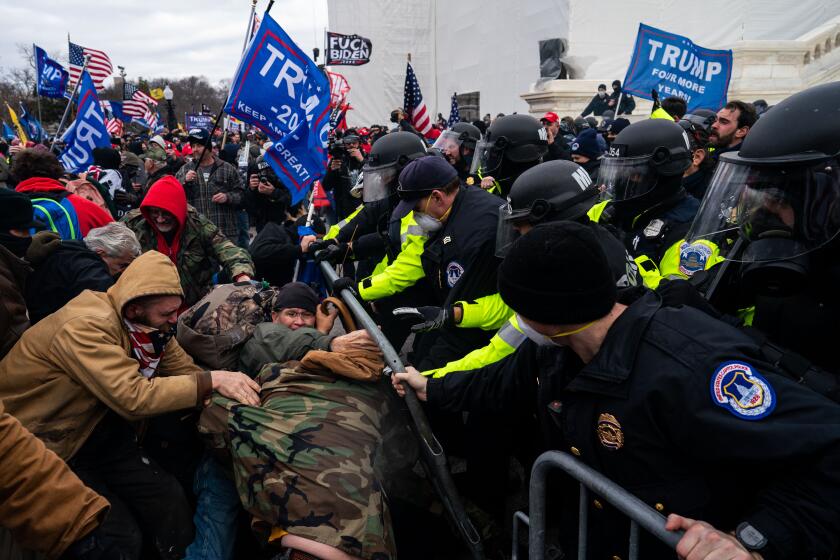A midterm elections threat assessment — high and getting higher

- Share via
With the Nov. 8 midterm elections just two weeks away, there is growing concern for the potential of real-world political violence.
The hyper-partisan nature of U.S. politics, combined with rampant disinformation and the promotion of conspiracy theories about election integrity are increasing the prospects for trouble at polling sites and the harassment and intimidation of electoral workers. Across the country, there are reports of election offices taking preventive measures, including installing bulletproof and bomb-resistant glass, offering active-shooter training and fortifying walls with Kevlar to mitigate the effects of an attack.
Violent rhetoric is exploding online. Sites like Telegram, Gab and Parler are overrun with threats related to “taking up arms” in an effort to overturn by force what these individuals claim will be a “rigged” and “stolen” election. The temperature in the broader far-right ecosystem has been rising steadily since the FBI searched former President Trump’s residence at Mar-a-Lago in August. After the search, a radicalized Trump supporter attempted to attack an FBI office in Cincinnati and was killed in a shootout with agents.
The vitriol spewed on fringe message boards is sometimes instigated by public figures, including elected officials. Rep. Marjorie Taylor Greene (R-Ga.) recently spoke at a Trump rally in Michigan, firing up the crowd by declaring that “Democrats want Republicans dead, and they have already started the killings.” Using his own social media platform, Truth Social, Trump suggested Senate Minority Leader Mitch McConnell (R-Ky.) had a “DEATH WISH” because McConnell agreed to fund the U.S. government through the remainder of this year.
UC Davis study: Half of respondents expect civil war, 40% believe whites are threatened, 12% prepared to act.
When officials normalize violent rhetoric, it permeates the national discourse and lends credence to the idea that physical force is a legitimate political response. In other words, some members of Congress and a former president are attempting to mainstream fascism in America. In the first quarter of 2022, the U.S. Capitol Police opened 1,820 cases against individuals making threats against members of Congress.
Susan Collins, a fifth-term Republican senator from Maine, told the New York Times, “I wouldn’t be surprised if a senator or House member were killed,” going on to say, “What started with abusive phone calls is now translating into active threats of violence and real violence.”
Charges have been levied against more than 900 individuals for various crimes allegedly committed in the attack on the U.S. Capitol on Jan. 6, 2021. But the ongoing arrests and trials have had less of a deterrent effect on violent rhetoric and rumblings than many analysts expected. In part, this is related to the anonymity provided by encrypted social media platforms.
The staying power of the “Big Lie,” the falsehood pushed by Trump that the 2020 election was stolen, has acted as an intensifier of Americans’ tribal political animosity.
Election deniers are on the ballot in numerous states, with the Washington Post counting 291 such candidates in 48 out of 50 states. That is one sign that the concept of voter fraud is baked into the thinking of those who might foment political violence. According to the FBI, states that experienced “significant upheaval” related to the 2020 presidential election have been more likely to see an increase in midterm-related threats, with Arizona, Colorado, Georgia, Michigan, Nevada and Wisconsin accounting for 58% of such threats.
California voters see Jan. 6 as a subplot compared with issues such as abortion and the economy ahead of the 2022 midterm elections.
In many ways, far-right political figures are creating a self-fulfilling prophecy. They are telling their followers, if we lose, you’ve been cheated, a message that many seem to think makes “revolution” justified before the votes have even been cast, much less counted. A poll by the Bright Line Watch organization found that 1 in 5 Republican men believed that violence was justifiable “right now” against the U.S. government.
The threats are not purely domestic, either. Lawmakers and government officials are worried that external actors, including Russian and Chinese operatives, are meddling in the midterm elections by amplifying divisive, volatile issues — race, gender, immigration and inflation, for example — on social media.
The United States is a country awash in weaponry. The Switzerland-based Small Arms Survey estimates that for every 100 Americans, there are 120 civilian guns. That only adds to the worries of local, state and federal officials who must consider the prospect of violence that the elections and their outcome conjure in the wake of the Jan. 6 bloodshed in Washington.
With politicians and political influencers too often rewarded for staking out extreme positions, in turn stoking extremist violence, for the good of our country, let us hope that cooler heads prevail. Otherwise, the true outcome of the 2022 midterm elections may be a new normal in U.S. politics defined by disinformation and violence.
Colin P. Clarke is the director of research at the Soufan Group and a senior research fellow at the Soufan Center, where he focuses on terrorism, counterterrorism and international security.
More to Read
A cure for the common opinion
Get thought-provoking perspectives with our weekly newsletter.
You may occasionally receive promotional content from the Los Angeles Times.











